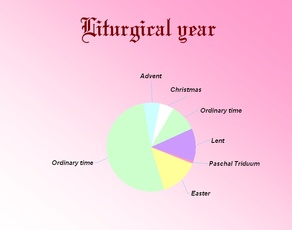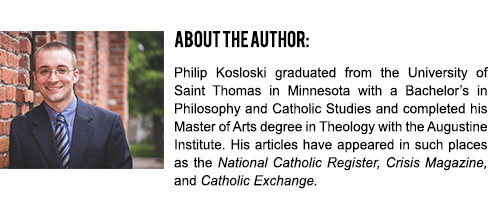
God knows us better than we know ourselves and because of that He inspired the Church to develop a "Liturgical Year," where we celebrate the life of Christ by observing various seasons and feasts.
The idea of an annual cycle of sacred celebrations is not something new as God previously instructed the Israelites to keep certain commemorations each year, remembering God's saving actions in their lives (like the Passover). Stemming from this ancient Jewish tradition, the early Christians started to develop a yearly cycle of feasts so that they would not forget the saving works of Jesus Christ. The Catechism of the Catholic Church further explains this practice of the Church: 1163 "Holy Mother Church believes that she should celebrate the saving work of her divine Spouse in a sacred commemoration on certain days throughout the course of the year. Once each week, on the day which she has called the Lord's Day, she keeps the memory of the Lord's resurrection. She also celebrates it once every year, together with his blessed Passion, at Easter, that most solemn of all feasts. In the course of the year, moreover, she unfolds the whole mystery of Christ. . . . Thus recalling the mysteries of the redemption, she opens up to the faithful the riches of her Lord's powers and merits, so that these are in some way made present in every age; the faithful lay hold of them and are filled with saving grace." 1164 From the time of the Mosaic law, the People of God have observed fixed feasts, beginning with Passover, to commemorate the astonishing actions of the Savior God, to give him thanks for them, to perpetuate their remembrance, and to teach new generations to conform their conduct to them. In the age of the Church, between the Passover of Christ already accomplished once for all, and its consummation in the kingdom of God, the liturgy celebrated on fixed days bears the imprint of the newness of the mystery of Christ. 1165 When the Church celebrates the mystery of Christ, there is a word that marks her prayer: "Today!" - a word echoing the prayer her Lord taught her and the call of the Holy Spirit. This "today" of the living God which man is called to enter is "the hour" of Jesus' Passover, which reaches across and underlies all history. Thus, we are able to relive Christ's life each year and so be nourished by the many mysteries of His life. As we know, repetition is essential if someone wants to master a particular task, job or sport. As the saying goes, "practice makes perfect." If we do not sit at our Lord's feet each year and learn what He wants to teach us, we will never grow in holiness. This is the beauty of the liturgical year, as it gives us a chance to follow Christ throughout His life on earth and learn from His example. In a certain sense, the liturgical year is similar to an apprenticeship. An apprentice who wants to learn from his/her master must walk in the master's footsteps and carefully observe whatever the master is doing. This takes time and for many professions it requires years and years of accompaniment before the apprentice can take over and imitate the master perfectly. So too in the spiritual life. Becoming a disciple of Christ never happens overnight. We must walk in Jesus' footsteps, carefully observing His every move. This takes a lifetime to master and so the Church provides for us the liturgical year, which repeats Christ's life and allows us to grow deeper in our knowledge and love of Jesus. Going forward, we will examine the liturgical year of the Church and discover the richness of each season and explore the many feasts that occur. By doing so, we will walk in Christ's footsteps and thank God for the many gifts He has given us.
0 Comments
Your comment will be posted after it is approved.
Leave a Reply. |
MASS SCHEDULE
Tuesday - Friday: 8:00 AM Saturday: 4:00 PM Sunday: 8:00 AM & 10:00 AM RECONCILIATION
Saturday: 3:15 - 3:45 PM OFFICE HOURS
Monday - Thursday: 8:30 AM – 5:00 PM Friday: 8:30 AM – 12:30 PM Stay Connected with Our ParishWelcome from Our PastorWelcome to Christ the King Catholic Church! Ever since 1938 this parish has been assisting souls in their quest for deeper union with God. Our mission statement is essentially found in the stained glass window above the main altar: “For Christ our King.” Insofar as God made us and we belong to Him, we have come to... Read More
Archives
February 2021
Categories
All
|
Copyright © 2024 Christ the King Parish. All Rights Reserved.
Mailing address: 306 S. LaSalle St, Spencer, WI 54479
(715) 659-4480



 RSS Feed
RSS Feed